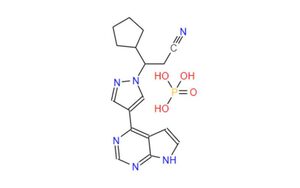Blog Information
- Posted By : qian liu
- Posted On : Mar 13, 2024
- Views : 11
- Category : General
- Description : Ruxolitinib Phosphate (Ruxolitinib) has become a cornerstone treatment for myelofibrosis, a rare bone marrow cancer. By inhibiting a specific protein pathway (JAK-STAT), Ruxolitinib helps control symptoms like fatigue, splenomegaly (enlarged spleen), and bone pain, improving patients' quality of life. However, a significant challenge emerges over time: patients develop resistance to Ruxolitinib, rendering the treatment ineffective.
Overview
This article explores the complexities of Ruxolitinib resistance and the promising possibilities of next-generation Ruxolitinib Phosphate API for overcoming this hurdle.
Understanding Ruxolitinib Resistance
Resistance to Ruxolitinib develops through various mechanisms. Cancer cells can mutate, essentially finding ways to bypass the drug's inhibitory effects on the JAK-STAT pathway. Additionally, other signaling pathways within the cells can become hyperactive, compensating for the blocked JAK-STAT pathway.
The Challenge of Resistance
The emergence of Ruxolitinib resistance presents a major obstacle in myelofibrosis treatment. Patients who develop resistance lose the therapeutic benefits of the drug, leading to worsening symptoms and a poorer prognosis. New treatment options are then needed, often with harsher side effects.
Hope on the Horizon: Next-Gen Ruxolitinib API
Researchers are actively exploring the development of next-generation Ruxolitinib Phosphate API with the potential to overcome resistance. These advancements can take several forms:
Modified Ruxolitinib Molecules: Scientists are designing Ruxolitinib analogs with modifications that might maintain their effectiveness against cells that have developed resistance to the original drug.
Combination Therapies: Combining Ruxolitinib with other drugs that target different aspects of myelofibrosis or block alternative signaling pathways could be a strategy. This approach might prevent or delay the emergence of resistance.
The Road Ahead
The development of the next-generation Ruxolitinib API is an ongoing process. Here's what to expect:
Clinical Trials: Promising Ruxolitinib analogs and combination therapies must undergo rigorous clinical trials to assess their safety and efficacy in patients with Ruxolitinib-resistant myelofibrosis.
Regulatory Approval: Once clinical trials demonstrate safety and effectiveness, regulatory bodies will need to evaluate the new Ruxolitinib formulations before they become widely available.
Manufacturing Considerations: Developing and scaling up production of next-generation Ruxolitinib API will require collaboration between researchers, pharmaceutical companies, and regulatory agencies.
Conclusion
Ruxolitinib resistance remains a hurdle in myelofibrosis treatment. However, the exploration of next-generation Ruxolitinib Phosphate API offers a beacon of hope. By developing Ruxolitinib analogs or effective combination therapies, researchers might equip healthcare professionals with tools to combat resistance and improve the long-term outlook for patients with myelofibrosis.
